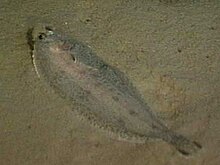Glyptocephalus
Appearance
This article relies largely or entirely on a single source. (August 2024) |
| Glyptocephalus | |
|---|---|

| |
| Glyptocephalus cynoglossus | |
| Scientific classification | |
| Domain: | Eukaryota |
| Kingdom: | Animalia |
| Phylum: | Chordata |
| Class: | Actinopterygii |
| Order: | Carangiformes |
| Suborder: | Pleuronectoidei |
| Family: | Pleuronectidae |
| Subfamily: | Microstominae |
| Genus: | Glyptocephalus Gottsche, 1835 |
| Type species | |
| Pleuronectes saxicola Faber, 1828
| |
| Synonyms | |
| |
Glyptocephalus is a genus of righteye flounders found in the northern Atlantic and northern Pacific Oceans
Etymology
[edit]The word Glytocephalus is derived from the Greek γλύφειν (glyphein), meaning "to carve", and κεφαλή (kephalē), meaning "head".
Species
[edit]There are currently four recognized species in this genus:[1]
| Image | Scientific name | Common Name | Distribution |
|---|---|---|---|
 |
Glyptocephalus cynoglossus (Linnaeus, 1758) | witch, witch flounder, pole flounder, craig fluke, Torbay sole and grey sole | northern Atlantic Ocean |
 |
Glyptocephalus kitaharae (Jordan & Starks, 1904) | Willowy flounder | northwest Pacific Ocean: Yellow Sea, Gulf of Bo Hai, East China Sea (Hokkaido, Taiwan, Japan) |
 |
Glyptocephalus stelleri (P. J. Schmidt, 1904) | Blackfin flounder | northern Pacific, from the Sea of Japan to the Strait of Tartary and southern Kuril Islands and out into the Bering Sea. |
 |
Glyptocephalus zachirus Lockington, 1879 | Rex sole | northern Pacific, from Baja California in Mexico up the coasts of the United States, British Columbia and Alaska, across the Bering Sea to the coast of Russia and the Sea of Japan. |
References
[edit]- ^ Froese, Rainer; Pauly, Daniel (eds.). "Species in genus Glyptocephalus". FishBase. April 2024 version.
